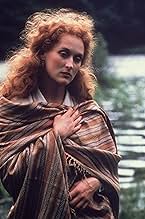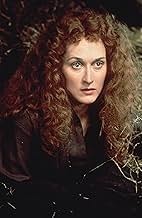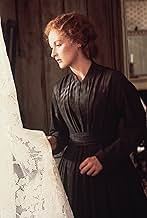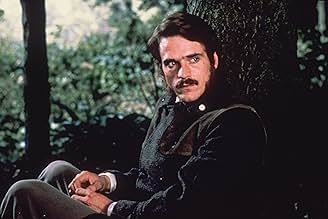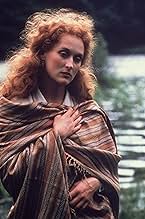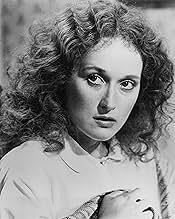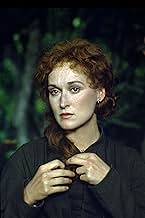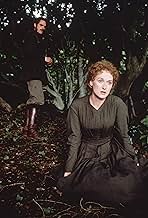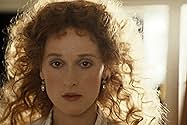Anna e Mike interpretam dois personagens em um cenário de cinema na Inglaterra do século XIX que se apaixonam, mesmo que o personagem de Mike esteja noivo.Anna e Mike interpretam dois personagens em um cenário de cinema na Inglaterra do século XIX que se apaixonam, mesmo que o personagem de Mike esteja noivo.Anna e Mike interpretam dois personagens em um cenário de cinema na Inglaterra do século XIX que se apaixonam, mesmo que o personagem de Mike esteja noivo.
- Direção
- Roteiristas
- Artistas
- Indicado a 5 Oscars
- 11 vitórias e 20 indicações no total
- Direção
- Roteiristas
- Elenco e equipe completos
- Produção, bilheteria e muito mais no IMDbPro
Avaliações em destaque
How unfounded my uncertainty was! The director, writer and actors did a fantastic job in adapting a complex novel to the screen. The film works impeccably as a metaphor for what the novel was trying to achieve, which is all we should expect from film adaptations.
Stand out features include:
The actors are perfect. I can't say anything new about Meryl Streep, who I believe to be the finest actress ever to have graced the cinema screen. Here (as ever) she is perfect - if you didn't know she was American you would believe she is English, the accent is so accurate. She embodies the character of Sarah perfectly with a multi layered performance, managing to convey Sarah's dignity, her independence and her complex mystery. My only criticism (if you can call it that) is that she is too beautiful! According to the novel, Sarah is "not beautiful by any period's standards", but with her porcelain complexion and delicate features, Meryl Streep is stunning. As Charles, Jeremy Irons gives a commanding performance, managing to convey the character's genteel veneer and the inner passion that lurks beneath. Both actors are excellent, and the chemistry between the leads is tangible.
A "Story within a story". The way in which Harold Pinter weaves the Fowles tale with the lives of Anna and Mike - the actresses who are playing the Victorian lovers, is inspired. The manner in which the film flits from Victorian age to modern day, is the filmic way of conveying Fowles's tendency in the novel to judge his Victorian characters and their era by Twentieth Century standards. Some critics have found this device jarring - I find it clever and affecting.
Overall, 'The French Lieutenant's Woman' is a beautiful, haunting tale of repressed love and social hypocrisy. Right from the opening shot, where we see the image of Sarah on the Cobb looking out to sea, the viewer is grabbed and drawn into this complex world. The actors are faultless, the screenplay ingenious and the cinematography and score, haunting. If you normally find yourself disappointed by novel adaptations, look no further than 'The French Lieutenant's Woman' to show you that when a work is adapted properly, the results can be stunning.
It reminded me of 'The Hours', only it has a less 'studied' feel to it. The realities of 'social exclusion' really hit home, but thanks to the great performances, we don't doubt the extremes shown. Love renders all other concerns as 'insignificant', when you're in its grip.
This isn't the kind of film I would normally like; but in my quest to sample as much that is acclaimed as possible, I ended up here. I'm glad I did. If you have romance in your soul, this is apt to get you, inside. I only left this out of my 250 list because due to being something of a 'grinch', I tend to side with LIFE'S version of how things end, rather than literatures; but oh well... !
Você sabia?
- CuriosidadesThe source novel does not feature the subplot of the actors and actresses playing the parts in a modern day movie. However, it had three alternate endings, from which readers could choose their favorite. Creating two parallel story lines allowed the filmmakers to include two of those endings, one happy and one tragic.
- Erros de gravaçãoWhile at the house in the Lake District, the reaction to Sarah being pushed to the ground by Charles is genuine. Meryl Streep actually hits her head on the floor and when Jeremy Irons acknowledges, she nods, giggles, and reorients herself in position next to him.
- Citações
Sarah: I knew it was ordained that I should never marry an equal; so, I married shame. It is my shame that has kept me alive - my knowing that I am truly not like other women. I - I shall never, like them, have - children and a husband, and the pleasures of a home. Sometimes I pity them. I have a freedom they cannot understand. No insult, no blame, can touch me. I have set myself beyond the pale. I am nothing. I am hardly human any more. I am the French lieutenant's - whore!
- ConexõesFeatured in The South Bank Show: The French Lieutenant's Woman (1981)
Principais escolhas
- How long is The French Lieutenant's Woman?Fornecido pela Alexa
Detalhes
Bilheteria
- Orçamento
- US$ 8.000.000 (estimativa)
- Faturamento bruto nos EUA e Canadá
- US$ 26.890.068
- Faturamento bruto mundial
- US$ 26.890.068


